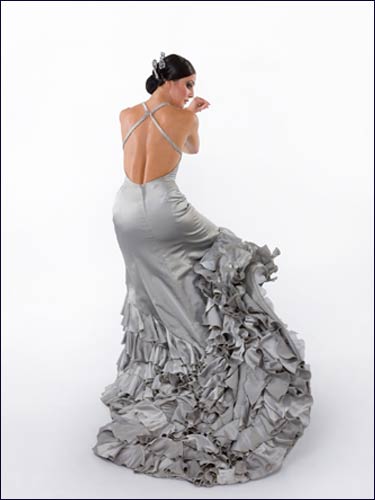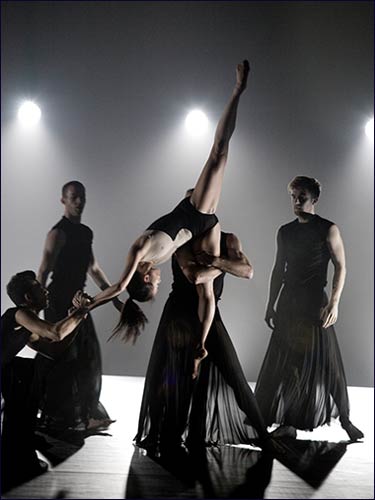By Avigayil Kadesh
The Israel Festival, planned for May 23 to June 22, may be celebrating its 52nd year, but as usual the list of performers and venues is fresh and new.
“I’ve been doing the festival for 22 years, but I feel like I’m doing it every year for the first time,” says Festival Manager Yossi Tal-Gan. “Every year it’s a new challenge to make it special and different.”
Among the talent he and his five-person staff have lined up are veterans and newcomers in the fields of dance, jazz, classical music, theater and family entertainment – from Israel and from abroad.
This year’s theme is Igor Stravinsky’s ballet The Rite of Spring, which debuted exactly 100 years ago. Several musical and dance pieces are to be presented based on this classic.

“Dressed to Dance” will feature flamenco dancers in costumes
by Picasso and Dali. Photo by Jesus Vallinas
There will also be shows by Israeli performing artists Nurit Galron and Shlomi Shaban, a children’s adaptation of Shakespeare’s As You Like It, and Israeli baroque ensemble Baraccade. Avital Meets Avital, a cross-genre music project featuring Avi Avital on mandolin and Omer Avital on bass and oud, is also on the bill.
A storybook by Israeli singer Rita will come to life on stage; choreographer Sharon Eyal will bring her dance company; and audiences will be introduced to Mind The Gap, an award-winning British theater company for actors with learning disabilities.
Free street theater and live jazz will be open to the public at The First Station, the newly restored old Jerusalem train station that is the city’s newest dining and leisure complex. The jazz ensemble will also perform in Jerusalem’s downtown pedestrian mall. The Jerusalem Biblical Zoo, celebrating its 20th anniversary at its current location, is participating with a full roster of entertainment every Thursday afternoon during the festival.
“The public comes back every year because they trust our judgment,” says Tal-Gan, formerly culture director of the Jerusalem municipality, director of the Jerusalem Symphony Orchestra and coordinator of the city’s “Jerusalem 3,000” festivities in 1996 and 1997.
“Many of our performers are not yet known. It’s one of our goals to expose new talent, Israeli and foreign.” Often, those who debuted at the Israel Festival went on to great fame, such as the renowned Batsheva Dance Company, whose first big performance opened Tal-Gan’s first year at the helm, 22 years ago.
Planning each year’s festival is a full-time task. Tal-Gan and his staff visit foreign festivals to scout out talent, and constantly initiate contacts with artists, agents, theaters and orchestras. Sometimes it takes years to arrange for a particular act to come for the Israel Festival.

The Grand Theatre de Geneve will perform.
Photo by Mikki Kunttu Showcasing Jerusalem
Though the Israel Festival began in coastal Caesarea and usually includes a few performances in other cities, such as Holon, in 1982 the country's capital “adopted” the event as its own. Since then, the majority of the festival’s performances are held in Jerusalem.
“We are always looking for events that show Jerusalem as a special city, and we try to combine the beautiful, historic sites of the city with some of the events,” Tal-Gan explains.
Venues include the Jerusalem Theater, the YMCA, the Eden-Tamir Music Center, the Zappa Club and Beit Shmuel, a theater in the Hebrew Union College complex designed by architect Moshe Safdie.
This year’s new venues include The First Station as well as Hansen Hospital, a restored historic building that once housed people suffering from leprosy. In the courtyard of the Tower of David, an ancient citadel near the Jaffa Gate entrance to the Old City of Jerusalem, Tal-Gan has planned “Dressed to Dance,” a flamenco performance by Spanish and Israeli dancers featuring costumes designed originally by Pablo Picasso, Salvador Dali and other artists from Spain.
“We try to have collaborations between foreign and Israeli artists because this has great potential for opening many doors to our artists,” he says.
The surprise hot ticket in this year’s Israel Festival has proved to be a reunion of Kaveret, a 1970s Israeli rock band known internationally as Poogy. “These seven singers and musicians started 40 years ago, and we convinced them to come back, maybe for the last time,” says Tal-Gan. “People bought 15,000 tickets in two hours.”
In fact, originally Kaveret was booked for one show at the Sultan’s Pool just outside the Old City walls. But the rush on tickets prompted the addition of a second show, which sold out within an hour. Encouraged by their unexpected popularity, Kaveret booked an August gig in Tel Aviv, for which 35,000 tickets were sold in one day.
Such is the power of the Israel Festival, which has emerged as an important platform for promoting artistic encounters crossing political and national boundaries.